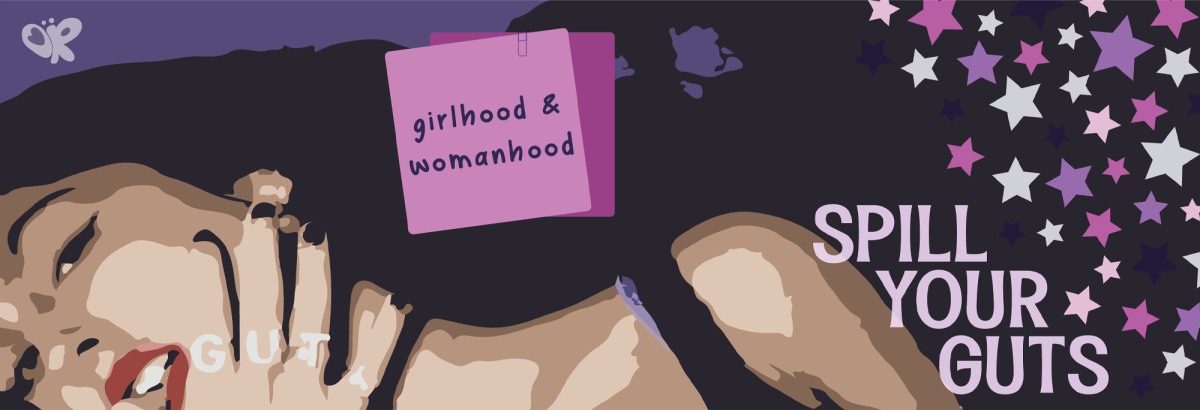On Sept. 8, Olivia Rodrigo released her sophomore album “GUTS.” Since then, the album has experienced a soar in popularity and audience approval.
The album contains many upbeat pop-rock songs that give it a non-serious edge; however, they are integral to the picture Rodrigo is trying to illustrate. “GUTS” holds one of the most powerful narratives about girlhood I’ve ever experienced in music.
The album’s opening contains the songs “all-american bitch” and “bad idea, right?” which start the album with early 2000s nostalgia while simultaneously expressing the experience of a new generation of teenagers.
“My favorite song was ‘all-american bitch’,” Chandana Deepthi, a computer science freshman said. “[There are themes] about the preconceived notions about being a teenager.”
The song “all-american bitch” oscillates between sweet, melodic verses and a temper-fueled rock chorus, musically representing the inner rage that girls feel despite being expected to be “grateful all the time” or “sexy and kind” on the outside.
The album’s beginning sets the tone for the most prominent narrative: The transitional space between girlhood and womanhood is precarious.
“Her songs express some of the immaturity that follows you into adulthood,” Katelyn Menard, a political science sophomore, said.
However, despite the bratty anthems that characterize the album, Rodrigo does not shy away from getting vulnerable as she proves her songwriting ability with ballads like “making the bed” and “teenage dream.”
Rodrigo ponders her responsibility in these tracks and what it means to truly learn from her youthful mistakes.
Lyrics like “I’m playing the victim so well in my head/ But it’s me who’s been making the bed” exemplify a form of ownership over one’s mistakes and serve a powerful theme alongside the album’s illustrations of the difficulties of womanhood.
In the album’s closer, “teenage dream,” Rodrigo laments, “When are all my excuses of learning my lessons gonna start to feel sad.” There is a profound vulnerability being tapped into during the song. She acknowledges that, societally, there comes a time when a girl is no longer seen as young enough to keep making mistakes, a strong narrative that is painfully relatable.
The song “pretty isn’t pretty” is another stand-out on the album, as it gives an authentic account of the effects of beauty standards. Rodrigo forgoes being cryptic and provides a whole-hearted exclamation of the never-ending cycle of trying to be the “perfect woman.”
Rodrigo sings, “I chase some dumb ideal my entire life/ But none of it matters/ And none of it ends.”
Despite the somber theme about the harsh realities of body image, the song contains signature pop elements and a catchy guitar progression. Yet, the tone of her voice is highly expressive.
“It’s pretty cool when artists do this… It’s a happy-sounding song, but it talks about issues that a large group of people face,” Emily Quartz, a psychology sophomore, said.
Ultimately, the album “GUTS” is the acknowledgment and subsequent rejection of standards, especially those placed on young women. This is one of the album’s most relatable and endearing aspects, and Rodrigo conveys it masterfully.
“Everybody is expected to be held to a standard… I felt like that was the overarching theme of the album,” Kristan Beluso, a computer science freshman, said. “[The album says] ‘I’m done with the standard,’ and I really enjoyed that.”
While “GUTS” has been met with success regarding audience approval and experienced a record debut on the billboard charts, there are still criticisms surrounding Rodrigo’s originality. Many listeners believe her sound is too similar to other artists, claiming her work is unoriginal.
“Even though her sound isn’t especially unique, the reason she is blowing up right now is because she represents a new generation of teenage girls,” Menard said.
Though she may take inspiration from her contemporaries, this is not necessarily bad. It seems that what makes her stand out are the stories she’s telling, which represent a budding generation of young people.
Rodrigo gained some of her fame and opportunity through being a child actor on Disney, and she has been taking voice lessons and piano lessons since the age of five.
“Her privilege definitely cannot be ignored,” Quartz said. “Some artists are sending the same messages she is, but they aren’t receiving the same recognition. Everybody should start listening to women and what they have to say about our experience.”
Overall, Rodrigo successfully conveys a powerful message about the transition from girlhood to womanhood and the standards that must be rejected in order to fully accept oneself.
-Faith Fabian is an English sophomore
The University Star welcomes Letters to the Editor from its readers. All submissions are reviewed and considered by the Editor-in-Chief and Opinions Editor for publication. Not all letters are guaranteed for publication.




















